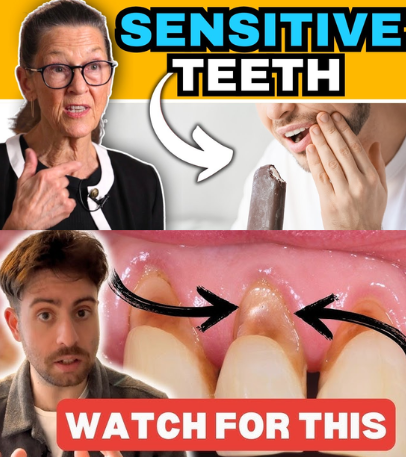
What Is Tooth Sensitivity?
Tooth sensitivity, also known as dentin hypersensitivity, is that sharp, sudden pain you feel when your teeth come into contact with hot, cold, sweet, or acidic foods and drinks. Sometimes even breathing in cold air or brushing your teeth too hard can trigger it. While it may feel like a small inconvenience at first, sensitivity can make eating, drinking, and even smiling uncomfortable.
Why Do Teeth Become Sensitive?
Your teeth aren’t supposed to hurt when you drink a glass of iced water or enjoy hot coffee. So why does it happen? The root cause lies beneath the enamel—the protective outer layer of your teeth. When enamel wears down or gums recede, the underlying dentin becomes exposed. Dentin contains tiny tubes that connect directly to the nerve, which is why pain feels so immediate. Common causes include:
- Enamel erosion – From acidic foods, drinks, or teeth grinding.
- Gum recession – Often caused by gum disease or brushing too hard.
- Tooth decay – Cavities can open direct pathways to the nerve.
- Cracked teeth – Small fractures allow sensitivity triggers to reach the nerve.
- Dental procedures – Whitening, fillings, or cleanings may temporarily increase sensitivity.
Think of enamel as armor: once it’s weakened or missing, your teeth become vulnerable to outside attacks.
Recognizing the Symptoms of Tooth Sensitivity
The main symptom is sharp, short-lasting pain, but how it shows up varies:
- Pain when drinking hot, cold, or sweet beverages.
- Discomfort when eating sour or acidic foods.
- Sensitivity when brushing or flossing.
- Pain that comes and goes depending on triggers.
If the pain is constant, it may point to a deeper dental issue rather than typical sensitivity.
Video : How To Relieve COLD Tooth Sensitivity FAST
How Tooth Sensitivity Affects Daily Life
Tooth sensitivity might seem minor, but it can quickly impact your lifestyle. Imagine avoiding ice cream on a hot day, skipping coffee in the morning, or dreading brushing your teeth because of sharp jolts of pain. Over time, this not only lowers your quality of life but can also affect your oral health if you avoid proper cleaning due to discomfort.
Treatment Options for Sensitive Teeth
The good news? Sensitivity is manageable. Depending on the cause, treatment options include:
- Desensitizing toothpaste – Special formulas block the pain signals traveling through dentin.
- Fluoride treatments – Strengthen enamel and reduce sensitivity.
- Bonding or sealants – Cover exposed dentin or protect cracked areas.
- Gum grafting – For receding gums, tissue from elsewhere in the mouth can cover exposed roots.
- Root canal – In severe cases where pain is persistent, this procedure removes the nerve source of discomfort.
Your dentist will recommend the right treatment based on the underlying issue, not just the symptoms.
At-Home Remedies and Lifestyle Adjustments
You don’t always need complicated procedures to find relief. Small daily habits can go a long way:
- Use a soft-bristled toothbrush to avoid damaging enamel and gums.
- Brush gently with fluoride toothpaste twice a day.
- Limit acidic foods and drinks like soda, citrus, and wine.
- Drink water after meals to wash away acids.
- Wear a night guard if you grind your teeth during sleep.
- Avoid overusing whitening products, which can increase sensitivity.
These changes won’t fix deep dental problems, but they can prevent sensitivity from getting worse.
When to See a Dentist
Mild sensitivity is common, but certain situations call for professional help:
- Pain lasts longer than a few seconds.
- Sensitivity is isolated to one tooth.
- Visible cracks, chips, or cavities are present.
- Gum tissue looks swollen or receding.
Ignoring these signs can lead to bigger problems like infections, advanced decay, or even tooth loss.
Prevention: Protecting Your Teeth Before Sensitivity Starts
The best way to deal with tooth sensitivity is to stop it before it begins. Here’s how:
- Stick to good oral hygiene habits.
- Visit your dentist regularly for checkups and cleanings.
- Wear protective gear if you play contact sports.
- Manage acid reflux or other conditions that erode enamel.
- Eat a balanced diet rich in calcium and vitamin D for strong teeth.
Think of prevention as investing in your smile—it saves you pain, time, and money in the long run.
Video : Sensitive tooth? – Treatment of DENTIN HYPERSENSITIVITY and its causes | Dentalk! ©
Conclusion: Say Goodbye to Tooth Sensitivity
Tooth sensitivity can feel like a sharp interruption to daily life, but it doesn’t have to be permanent. By understanding the causes, recognizing the triggers, and applying the right treatments, you can restore comfort and protect your oral health. Small steps—like gentle brushing, smart food choices, and regular dental visits—make a big difference. Your teeth are meant to enjoy life’s flavors without pain, so give them the care they deserve and keep your smile strong.


